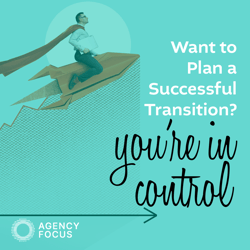Key People & Roles In almost every organization their people are their most valuable asset. Inside...
You're in Control
 Over the past 18 months, we have experienced the highest interest rates since 2000, with them peaking at 7.08% in November of 2022. Over one-third of the independent insurance agencies in the U.S. anticipate a change in ownership in the next two years, which means that over 13,300 agencies will transition ownership according to the 2022 Agency Universe Study. Many agency owners plan to transition their ownership to family, children, or a current partner, and if a bank loan is involved the change in interest rates can have a significant impact on the price of their agency and their retirement. Now more than ever, it is important for agency owners that wish to maximize the value of their agency to focus on the things that they can control.
Over the past 18 months, we have experienced the highest interest rates since 2000, with them peaking at 7.08% in November of 2022. Over one-third of the independent insurance agencies in the U.S. anticipate a change in ownership in the next two years, which means that over 13,300 agencies will transition ownership according to the 2022 Agency Universe Study. Many agency owners plan to transition their ownership to family, children, or a current partner, and if a bank loan is involved the change in interest rates can have a significant impact on the price of their agency and their retirement. Now more than ever, it is important for agency owners that wish to maximize the value of their agency to focus on the things that they can control.
Get Informed
Take a close look at your agency’s financial statement and get to know your numbers. Compare your agency’s performance to the industry standards to determine the areas where you are lagging behind and the areas that you excel. When you are planning to sell, a buyer will use these benchmarks to set their expectations on what it will take to run your agency and what profitability they can expect for an agency of your size. For those agencies that are outperforming the benchmarks, the benchmarks can create a discount for your agency. It is in your best interest to know your own proven performance and maximize that performance prior to selling your agency both internally and externally.
Profitability
The best way to maximize the value of your agency when you are selling is to run your business like you’re selling it tomorrow. By removing all discretionary expenses and investing those funds in the growth of your agency, you will position your agency to command the maximum value at the time of your ownership transition. This will allow you to fund the investment in the resources, infrastructure, and technology, and support your agency needs to operate efficiently and be positioned for growth and scale. Common investments can include people, training, technology, and the development of strong operating procedures.
Transition time
Do not wait until you are ready to walk away to start planning to sell your agency. We are in a relationship business, so you are an important component in the transition of the ownership of your agency. By working through a transition plan to provide a warm handoff of your staff, customers, centers of influence, referral partners, and carrier partners, you will increase the likelihood that those key relationships will stay with the agency. Your recommendation and behavior will speak volumes to the people who have trusted you. They will look to both your actions and your words to determine if they want to continue to do business or work with your successor. If you are not willing to work with them, they may not want to either, and that would be detrimental to the retention of key staff, customers, and ultimately the value of your agency. Plan to spend this time to ensure that you are able to demonstrate your strong support to your successor.
Minimize Risk
Be aware of the risks inside your business and work to reduce those risks prior to your transition. There are three main types of risks: concentration, performance and culture. Consider the areas of your agency that are dependent on one person, one carrier, one relationship. This could be related to a specific area of expertise, risk appetite, or simply a responsibility that you have never opened up to anyone other than a key person inside your agency. Whenever possible look for ways to minimize that risk by exposing multiple people to the customer relationship, invest in training, and document the processes that are handled in all key roles to minimize the delay or confusion should any key employee no longer be part of the team.
Performance Risk
To address risk in performance, it is critical to know the key performance indicators that will impact the value of your agency. You should know what the growth, retention, new business, profitability, and efficiency expectations are for the key roles inside the agency. By knowing these standards, you can work to strengthen the areas of your agency that are weak, and highlight your agency’s areas of strength. These performance indicators will serve as a guide for you to where to invest and also provide a way to measure the success of your investments. Too often when technology is implemented there is no way to measure the impact, which makes it hard to know the return on your investment. Think of these performance metrics as ways to measure your ROI.
Culture Risk
The last area of risk is culture. This is the area that many times is the most important as well as the hardest to mitigate. This encompasses how you run your agency, is your sales and service work clearly defined or is it blended roles inside your agency? How do you drive new business to your agency? Is it based solely on referrals, or do you have a well-defined strategy for attracting new clients with a content and marketing strategy? Do you have contracts in place with your staff, or are you at greater risk of losing business if they leave the agency? What is the level of expertise inside your agency when it comes to coverage, technology, automation, and innovation? Have you created a culture of trust that allows you to embrace change, or do you have a culture in your agency that resists change? All of these factors are important to the continuity of your agency in a transition of ownership. How you lead your team can impact the value of your agency, so think about ways to foster a culture of trust. It will have a positive return.
The compensation structure as well as the benefits package that you provide for your staff is also an area that will impact the value of your agency. When another agency is looking to buy or when the next generation is looking to purchase the agency, the compensation structure will impact the cash flow of the agency. Compensation is the largest controllable expense inside any agency, so if your compensation structure is not in line with the industry standards, it may be difficult to continue and also provide you with the price you expect for your agency. If the incoming owner makes a change to the compensation structure they will be at risk of losing talent and staff that are critical to keeping the customers and relationships with referral partners and carriers. If you want to maximize the value of your agency, you need to embrace a strategy to move your staff to compensation plans that are tied to the growth of your agency long before you plan to transition the ownership of the agency. If you do not make this change inside your agency, and your compensation structure is not in line with industry standards, you need to be realistic in your expectations for the price of your agency.
There are many things you can do to plan for the successful transition of your agency, and it starts with focusing on the factors that will impact the value of your agency that you can control. Well-run agencies will continue to command high multiples regardless of interest rate fluctuations and other factors that are not within our control. By knowing your numbers, focusing on driving profitability and performance inside your agency, and planning ahead, you will maximize your agency’s value and be well-positioned when the time comes for you to transition the ownership of your agency.
For more information on how to best prepare for the future of your agency visit www.agency-focus.com or email carey@agency-focus.com



